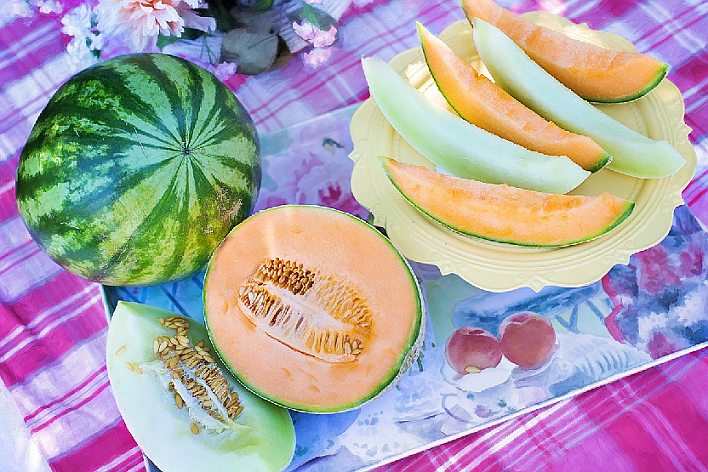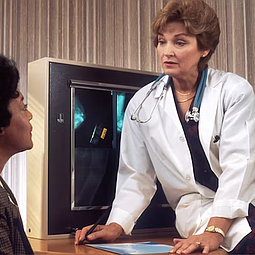Cantaloupe and Melons Pack a Healthy Punch
April 25, 2024 at 1:23 p.m.
Go for the melons this summer. Eating cantaloupe and other melons on a regular basis may help improve your vision and provide a host of other health benefits. The fiber content may be highly beneficial for older adults. Just one cup of cantaloupe contains 6% of the daily recommended amount of fiber. Fiber can help a person feel full longer. Additionally, it helps regulate digestion and keeps blood sugar in check.
“Vision can decline with aging, but consuming antioxidant-rich foods such as cantaloupe and other melons can help protect your eyes. Some of these antioxidants include lutein, and vitamins A and C,” said registered dietitian Katherine Basbaum with the University of Virginia (UVA) Health System Virginia, Charlottesville, Virginia.
Cantaloupe is in the Cucurbitaceae family, along with watermelon, cucumber and honeydew. A one-cup serving of cantaloupe has only 50-55 calories, but it contains 106% of the vitamin A daily recommendation and 95% of vitamin C daily recommendation. In addition, cantaloupe is rich in potassium and folate.
A cup of honeydew has 60 calories, 51% of the vitamin C daily recommendation and 11% of the daily recommended potassium. Honeydew also contains fiber, folate and vitamin B6. Watermelon contains about 45-50 calories per one-cup serving. It’s very rich in the antioxidant lycopene, which is linked to decreased risk of cancer, heart disease and age-related eye disorder. Watermelon also is rich in vitamin A, vitamin C and potassium.
Because melons have such a high water content and contain potassium, they may be good for maintaining healthy blood pressure levels. “Melon is about 90% water by weight, so it can be a great way for adults over 50 to stay hydrated. Sense of thirst can decline with age so eating fruit like cantaloupe and melon can help fill in gaps from drinking less water,” said Basbaum.
Cantaloupe has beta-carotene, a carotenoid that is responsible for giving fruits their color. Cantaloupe contains more beta-carotene than other yellow and orange fruits including oranges, nectarines, mangoes, peaches, and grapefruit. Beta-carotene is converted into vitamin A in the body and assists with blood cell production and immune response. It also promotes eye health.
“Overall, consumption of cantaloupe and other melons should be recommended for older adults. Not only is it packed with vitamins, minerals, fiber and antioxidants, but it is also budget-friendly, easy to find and a delicious addition to a balanced diet,” said Basbaum. “There is research to support increased intake of fruits and vegetables to lower risk of certain cancers.”
Cantaloupe and honeydew melons belong to the muskmelon family. These melons first grew in the Middle East. There are many different varieties. Watermelon originated in Africa and has more than 1,200 different varieties. “Aside from a specific type called ‘bitter melon’, there do not appear to be any known food-drug interactions with the sweet, more common melon varieties like cantaloupe or honeydew,” said Basbaum.
When picking a melon, it is recommended that you choose a firm melon with no significant bruising. Watermelons are best if they have a yellow belly. This indicates they have been allowed to ripen in the field instead of the grocery store or marketplace.
If possible, it is recommended that you don’t eat pre-cut cantaloupe because it is uncertain how long it has been since it was cut. After a knife cuts through any pathogens on the outside of the cantaloupe are now on the inside. “It's important to wash the melon before cutting for food safety. Melons are an often overlooked source of potential foodborne illness,” said nutritionist Caroline Passerrello, who is an Instructor at the University of Pittsburgh and a spokesperson for the Academy of Nutrition and Dietetic.
Paul Arciero, who is a professor in the Department of Sports Medicine and Nutrition at the University of Pittsburgh, said it is fine to buy pre-cut melon as long as the melon was thoroughly washed, cut and prepared on a clean surface. “It should be refrigerated in an air-tight glass container as soon as possible. It should be consumed within 5 days of being cut and refrigerated,” said Arciero. “Melons can be part of a healthy diet when consumed using proper handling and storage techniques and in moderation.”
However, Basbaum said, when possible, it is best to skip pre-cut cantaloupe. “For older adults, the safest bet is to avoid pre-cut melons from the grocery store. It is sometimes more difficult for older adults to fight off infections and though it is generally low, the risk of germs lurking in pre-cut melons can be higher than buying the whole melon. Just be sure to rinse the outer skin of the melon before slicing into it,” said Basbaum.
Besides eating them raw, melons are excellent for making frozen popsicles by pureeing the melon with a little sugar and a splash of lime juice. Pour into molds and freeze a great summertime snack. Melons are great for infusing water. Infused water serves as a delicious beverage that contains no added sugar. Another suggestion is making kabobs using grapes, melons and strawberry cubes. Melons can make good smoothies since their flavor is mild and they pair nicely with other fruits.
“For the average healthy adult over 50, cantaloupe and other melons can be eaten every day, if desired. However, when it comes to achieving optimal nutrition and meeting essential vitamin and mineral needs, the more variety the better as each type of fruit offers its own unique nutritional benefits,” said Basbaum.
John Schieszer is an award-winning national journalist and radio and podcast broadcaster of The Medical Minute. He can be reached at medicalminutes@gmail.com.





